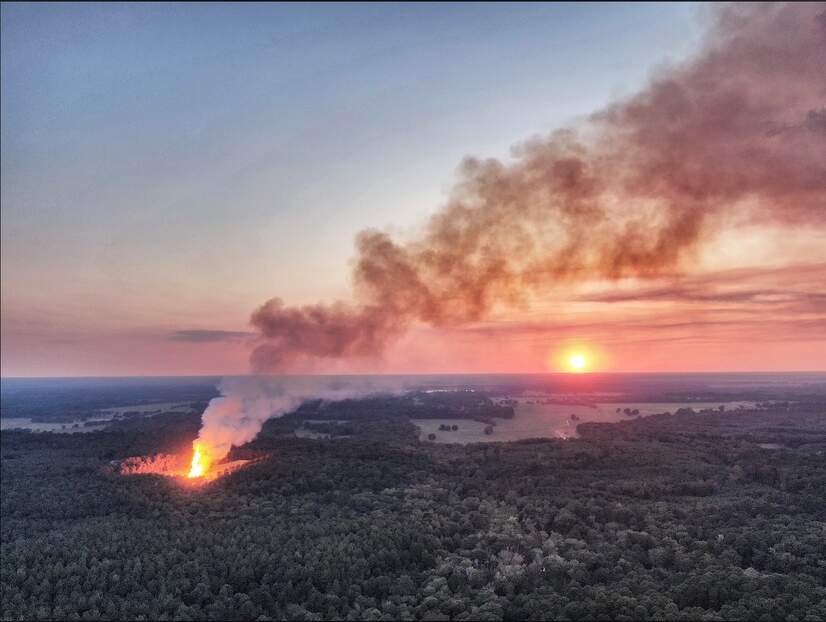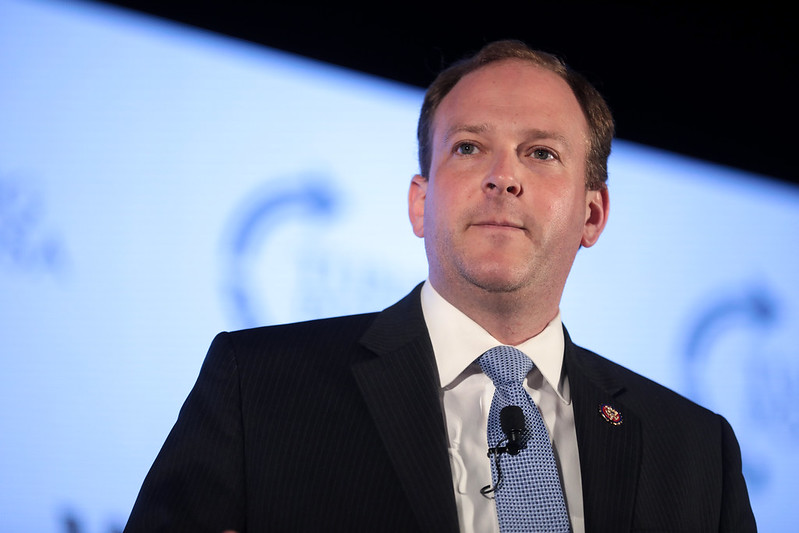As 2019 comes to a close, DeSmog is reflecting on another year that featured high-impact investigations and accountability reporting by our team of journalists about the reckless fossil fuel industry. From new revelations regarding dangerous fossil fuel infrastructure, to new documents shedding light on early efforts to undermine climate science and exert industry influence over climate and energy policy, the past year was filled with exceptional investigative work by DeSmog. The following recaps some of the highlights of our public interest reporting over the past year.
Weymouth Compressor Air Permit
Earlier this year a DeSmog investigation including public records requests revealed that the Massachusetts Department of Environmental Protection failed to disclose new evidence of toxic pollutants at the site of a planned gas compressor station in Weymouth, Mass. DeSmog found that DEP had received air quality sample test results from a Rhode Island lab that indicated elevated levels of toxins and possible carcinogens, including several compounds that were not included in a previous air sampling test done by a private lab. The Rhode Island lab results were excluded from a health impact assessment (concluding exposure to the compressor station would have little impact on human health), and the assessment paved the way for DEP to issue an air quality permit for the proposed compressor station.
DeSmog’s revelation led DEP to release an amended air quality report that included a dozen previously unreported toxins. DEP then admitted it had issued the permit working with only partial air quality data, though records requests further revealed that the agency planned to test for only 40 toxins rather than 64 as the agency had claimed.
This air quality discrepancy was just one part of a layered story on the controversial Weymouth compressor project, which recently began construction despite ardent – and ongoing – community resistance.
Virtual Pipelines
The expansion of fracked gas infrastructure like pipelines and compressor stations, and accompanying activist opposition, is a familiar struggle. But one part of this infrastructure that has received very little attention is the transport of compressed natural gas by trucks. DeSmog reporter Justin Nobel reported on this truck transport and explored some of the risks involved.
This system of “virtual pipelines” is intended to fill in the gaps, delivering gas to areas not connected to the distribution system or transporting it between pipelines. The trucks carry cylinders filled with highly pressurized compressed gas, operating under special permits from the U.S. Pipeline and Hazardous Materials Safety Administration. But a string of accidents in recent years have called into question the safety of these “virtual pipelines” and possible permit violations. Records reveal that one company, Xpress Natural Gas (XNG) based in Andover, Mass., had nine crashes in New York since September 2017. In early March of this year another crash was reported, this time involving a truck owned by the company NG Advantage. According to the accident report, tanks were leaking gas, and several nearby homes had to be evacuated. A PHMSA spokesman could not say whether these trucks were in violation of their special permits, but the accidents are reportedly under investigation by a federal agency that regulates trucking.
Bomb Trains: The Book
Another incredibly dangerous practice of fossil fuel transport, also with a record of disastrous accidents, is moving oil by rail. These “bomb trains” are the subject of a new book released this year by DeSmog’s Justin Mikulka. The book is the culmination of extensive research and reporting, first published by DeSmog, over six years following the deadly derailment of a crude oil train in Lac-Mégantic, Quebec in 2013.
Mikulka examines derailments that have occurred since then, including recent incidents involving updated cars that are supposed to be safer. But safety, he finds, has been compromised by a rail industry lobbying for lax regulations. The industry fought to repeal a rule requiring a modern braking system, for example, a rule that the Trump administration was happy to rescind.
The book explores the concerning deregulation of these bomb trains that literally poses a deadly risk. “As we pass the six year anniversary of that deadly disaster, it is disturbing to see the further unraveling of oil-by-rail protections in the face of the very real and established risks to people and environment,” Mikulka writes.
North Dakota Gas Plant Whistleblower
A former North Dakota gas plant operator with first-hand experience of the oil and gas industry’s disregard for safety concerns spoke on the record about troubling conditions he observed at two gas plants in the heart of the Bakken oil fields. Both plants are run by Oklahoma-based ONEOK Partners, and one of them was the site of a huge oil spill that a DeSmog investigation revealed had been seriously downplayed in size for years.
That spill at the Garden Creek Plant, where whistleblower Paul Lehto had worked in 2015 and 2016, had been reported as a mere 10 gallons by state regulators from 2015 to 2019. But as DeSmog reported in August, the actual size of the spill was estimated at 11 million gallons, which would put it on par with the 1989 Exxon Valdez spill as one of the largest oil spills in U.S. history.
This revelation, first brought to DeSmog’s attention by the whistleblower, had widespread impact. “The spill, initially reported by DeSmog on August 19, has since been reported in papers across the nation and in every major North Dakota city, and the incident has jostled the state’s typically pro-industry politics,” DeSmog’s Justin Nobel writes in a follow-up piece reporting the whistleblower’s story. This spill was just one of multiple incidents and concerns that Lehto observed during his time working for ONEOK, and the company took no efforts to address them. Lehto ended up quitting as a result.
Koch Network Database / KochDocs Archive Launch
A new database and archived collection of documents reveal the enormous influence that the fossil fuel baron Koch brothers have exerted in American politics, particularly in the realm on energy and environmental policy. The KochDocs provide a trove of information on the early workings of the Kochs in this arena and how they helped push their extreme anti-regulatory agenda into the mainstream. “The documents shine new light not only on the Kochs’ early opposition to the formation of the Department of Energy but also on their evolution from direct participation in politics to secretive behind-the-scenes funders of the American political right,” DeSmog’s Sharon Kelly writes.
Global Climate Coalition Documents
Earlier this year DeSmog, in collaboration with the Climate Investigations Center and Climate Liability News, published hundreds of previously undisclosed documents from the influential industry group Global Climate Coalition – a key player in the climate denial and disinformation campaign throughout the 1990s. The GCC formed in 1989 and disbanded in 2002, and the documents cover that entire time period and reveal how the group worked to overemphasize uncertainty in climate science, manipulate the international scientific body tasked with studying and reporting on the science, and weaken international climate negotiations. These documents are likely to be used as key pieces of evidence in ongoing climate liability lawsuits filed against fossil fuel companies like ExxonMobil, Chevron and Shell, all former members of this climate denial organization.
Imperial Oil Documents
Related to the GCC documents, another collection of documents released recently by DeSmog and Climate Investigations Center reveals new information on the extent of knowledge on climate science and economics that Exxon’s Canadian subsidiary, Imperial Oil, had decades ago. As DeSmog’s Brendan DeMelle explains, “There are many issues and themes covered in this new collection that will be of interest, including Imperial’s relations with First Nations, its early analysis of potential carbon tax schemes and pollution abatement policies, the oil industry’s forays into Arctic drilling and transporting crude oil under harsh conditions, and much more.” These documents have already provided a basis for news reports, which are listed here, and offer further context to the continuing effort to hold fossil fuel companies accountable for the climate crisis.
Koch-Fueled Attacks on Clean Cars and EVs
2019 was another busy year for the Koch-funded attacks on clean cars and consumer choice. Emails obtained by Documented, a watchdog group that tracks corporate influence in government, revealed that the American Fuel & Petrochemical Manufacturers (AFPM) were actively recruiting Republican Governors to sign onto a public comment letter supporting the weaker CAFE (corporate average fuel efficiency) standards, while also “shopping around” a pre-written op-ed with language borrowed from the American Energy Alliance, a free market advocacy group run by a former Koch Industries lobbyist.
To get to the bottom of how deeply involved the oil industry was in crafting a rollback of the Obama-era clean car standards, Senator Tom Carper and Representative Frank Pallone, Jr. requested records from the EPA of all agency meetings and correspondences involving the SAFE Vehicles rule with: Marathon Petroleum, AFPM (and member companies), Koch Industries, the American Legislative Exchange Council (ALEC) and its members, and Americans for Prosperity, the main advocacy arm of the Koch network. With the results in hand, Carper and Palone called out then EPA Administrator Andrew Wheeler for knowingly deceiving the public and Congress on the proposed Safer Affordable Fuel-Efficient (SAFE) Vehicles rule.
They accused the Trump administration of ignoring mountains of evidence showing clearly that the rollback “would dramatically weaken future vehicle fuel economy and greenhouse gas standards, significantly harm the American economy, and reduce America’s global competitiveness,” while also making automobile travel more dangerous.
Fracking for Plastics All Over America
DeSmog journalists continued to investigate the expansion of the fracking-fueled petrochemical industry and collusion across the regulatory landscape, as well as the ongoing struggle for environmental justice in Louisiana’s Cancer Alley and the emerging Appalachian Cancer Valley.
While the Ohio River Valley, long home to the coal and steel industries, is no stranger to air pollution, the region’s natural gas boom and burgeoning petrochemical industry threaten to erase the gains of recent decades. Concerns about air quality, which has already begun declining nationally since 2016, are growing rapidly for those living in the shadow of Shell’s $6 billion plastics plant under construction along the Ohio River in western Pennsylvania’s Beaver County.
Stay tuned for more DeSmog investigations in 2020 and beyond!
Main image: Screen shot from drone video of a fracked gas well blowout, at a well operated by GEP Haynesville, LLC, in Red River Parish, Louisiana. Credit: Phin Percy Jr., used with permission
Subscribe to our newsletter
Stay up to date with DeSmog news and alerts







